16 July 2004
Bonaire N12.0957 W068.1694
Homeland Security, Immigration and the 4th of July
There has been a great deal of activity at the ports in Bonaire as they tighten security to comply with the International Maritime Security Act. The main pier in Bonaire now has a security gate and the yard surrounding the containers has been encircled by an eight foot fence topped with barbed wire. This pier was a popular dive sight but diving will now only be allowed with prior approval and new security procedures. Local fishermen may also need to find another pier to fish from if the gate is ever locked. Of the 147 countries signing the accord only about 57% are now enforcing the new procedures which were to be inplace on 1 July 2004.
The threat of international terrorism has brought about improved immigration procedures and enforcement throughout the world. Without the flourish of the U.S. Homeland Security Act other nations have quietly tightened immigration regulations, standardized procedures, and provided follow-up which had been as absent as it was in the U.S. Sometimes it is inferred that this toughened stance is taken with an attitude of reciprocity toward the U.S. due to our crack down on illegal immigrants and shorten periods of visitation. With the great amount of flexibility given local immigration agents it is sometimes difficult to tell policy from personality but we have heard of some countries where only U.S. citizens have to pay certain immigration or airport taxes. I suspect that this is due to the need to improve airport security based upon FAA regulations.
Immigration procedures are different on every island and are always confusing. It is least painful in countries where the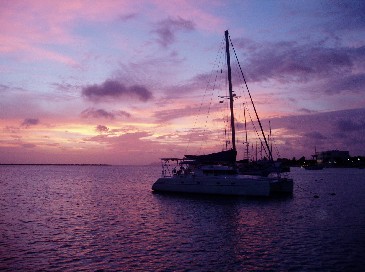 procedure can only be handled by an agent who collects your papers and money and at some later date returns with the proper stamps and documents and a little change. Even in the five islands that make up the Netherlands Antilles the laws are interpreted differently and the immigration clerk you are dealing with can be as difficult or lenient as he or she chooses. You therefore appear before customs and immigration with hat in hand and on your best behavior. They have the authority to not let you enter the country and in some cases have an autocratic attitude matching this power. I have not heard of a boat being visited by customs or immigration for an inspection but they do have the right to make you bring the boat to the dock to inspect every inch of it. Certainly they have a job to do for they are the first line of defense in keeping trouble off the shores of these small countries. Drug interdictions is of major concern in Bonaire and every week the local paper carries a police report covering the number of arrest at the local airport related to drug smuggling. procedure can only be handled by an agent who collects your papers and money and at some later date returns with the proper stamps and documents and a little change. Even in the five islands that make up the Netherlands Antilles the laws are interpreted differently and the immigration clerk you are dealing with can be as difficult or lenient as he or she chooses. You therefore appear before customs and immigration with hat in hand and on your best behavior. They have the authority to not let you enter the country and in some cases have an autocratic attitude matching this power. I have not heard of a boat being visited by customs or immigration for an inspection but they do have the right to make you bring the boat to the dock to inspect every inch of it. Certainly they have a job to do for they are the first line of defense in keeping trouble off the shores of these small countries. Drug interdictions is of major concern in Bonaire and every week the local paper carries a police report covering the number of arrest at the local airport related to drug smuggling.
Confusion comes when you ask for an extension or want to do something that is out of the ordinary of a typical tourists visit. If you are leaving your boat and flying out of the country it is important to have documentation from the marina stating that indeed your boat is in their custody and you are planning to return to it. Most islands require you to have a round trip ticket to protect themselves from visitors who don't have the means to return and therefore become a burden to the local government. Bonaire and Curacao have tightened immigration procedures recently by enforcing regulation that have been previously ignored. The particular article we speak of limits visa extensions to 90 days. In the past extensions were granted for almost indefinite periods but today they are limiting the stay of visiting boats including the few mega yachts that visit the island. These mega yachts can generate significant revenue for the marinas, provisioning companies and fuel distributors. This seems shortsighted for a country that generates 80% of its GDP from tourism. Well, we have about spent our 90 days here in Bonaire and plan to continue west although we have been told that the 90 days spent in Bonaire, NA will be applied to the island of Curacao, NA. If that is the case we will head for Aruba.
Our 4th of July celebration was held on Klein Bonaire, a small island across the bay from where we are moored. Since it was a calm day with flat water, we had no problem in our dinghy although it is the slowest of any of our friends. We rode over with the current and the wind in about 15 minutes. The day was made up of snacks, snorkeling, and bocce ball, a double elimination tournament being played with two sets of balls. The beach was m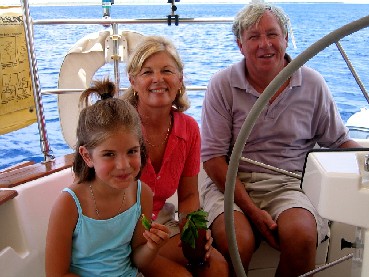 ostly white sand with a bit of coral rubble. By the time I walked to the end of the court I knew that I had to turn around to put on a pair of sandals. I am one of those people who hobble around like a cartoon character when I am walking on even the smallest stones. Every "oh" and "ouch" embarrasses me but it is one of those natural reflexes. How I envy all other seven players who were without any type of foot wear. O.K., so enough about my feet. ostly white sand with a bit of coral rubble. By the time I walked to the end of the court I knew that I had to turn around to put on a pair of sandals. I am one of those people who hobble around like a cartoon character when I am walking on even the smallest stones. Every "oh" and "ouch" embarrasses me but it is one of those natural reflexes. How I envy all other seven players who were without any type of foot wear. O.K., so enough about my feet.
The picture to the right was taken aboard Sojourner. Dick and Sue were kind enough to invite us over for a Father's Day brunch.
After the days festivities we headed back to Shiraz. The wind was now up and the current was against us and it took a good 30 minutes to return. We were of course soaking wet but if you live on a boat you can expect to be soaking wet occasionally even when you don't want to be. We will have to upgrade our dinghy motor someday in order to regain the speed we had a lighter dinghy. Such is boating, always trading up or down never satisfied with what you have.
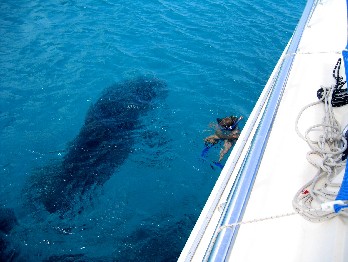
The picture at the left shows ZoŽ swimming with a sea monster that visited Shiraz one day. In fact it's thousands of sea monsters coalescing into one large cloud of newly hatched fish.
We are planning to leave Bonaire in the next week or so and have been watching weather closely. This is hurricane season after all. No hurricanes have found this area since the 1950 but it never hurts to be overly cautious. The passage to Curacao is only about 33 nautical miles but the entrance into Spanish Waters looks a bit tricky. We'll report our progress in the next log.
29 July 2004
Spanish Waters Curacao, Netherlands Antilles N 12.0480 W 068.5171
Downwind sailing
On the 17th of July we made the down wind sail to Curacao the "C" island of the ABC's and the administrative headquarters of the Netherlands Antilles. The wind was 20 knots with gust up to 27 and the following seas encouraged us to sail 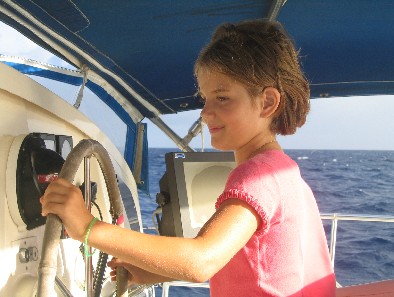 to the south of Kline Curacao and then jibe to the inlet for Spanish Waters. It was the first sail for ZoŽ and she was so excited that she became just a bit seasick but nothing that a little rest didn't overcome. The inlet to the lagoon was well hidden and narrow but once inside there were three marinas and a good holding area for anchoring. to the south of Kline Curacao and then jibe to the inlet for Spanish Waters. It was the first sail for ZoŽ and she was so excited that she became just a bit seasick but nothing that a little rest didn't overcome. The inlet to the lagoon was well hidden and narrow but once inside there were three marinas and a good holding area for anchoring.
The population of Curacao is approximately 140,000, a far cry form Bonaire which is 10,000. We checked in with customs and immigration and were granted the typical tourists visa good for two weeks. Since we needed to stay longer it was necessary to apply for an extension at the post office . After standing in line for two hours a clerk took our passports without providing us with a receipt and we were told to return in two days to pick them up. It seemed that quite a few people want to extend their stay as the line was always long. Sure enough upon our return to downtown, a 10 kilometer bus ride away, our passports were stamped with an extension allowing us to stay until 15 September as we had requested. Spanish Waters looks like a good place to stay put until our friends from Camperdown return from 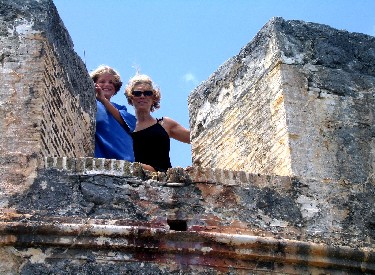 the U.S. and we push on to Cartagena. the U.S. and we push on to Cartagena.
Several deep water ports made Curacao the logical choice for the center of Dutch trade in the Caribbean. In 1863 the Dutch finally abolished slavery, up until then the most profitable trade on the island. In 1907 oil was discovered in Venezuela and by 1917 refineries were sprouting up in Curacao. Thanks to Shell Oil, petroleum refining became the primary industry on the island. Today the primary refining operations are owned by Venezuelan governmental agencies and the smoke that spews from the stacks is quickly swept away by the prevailing trade winds. Curacao is making a concerted effort to develop tourism as a strong secondary industry. Although we in North America think of going to the Caribbean during the cold months, Curacao is now in the height of the season as tourists from the Netherlands are more prevalent in August. The party boats are full on the weekends and when you go downtown giant cruise ships unload hoards of passengers to fill the local shops and bars. The entrance to the harbor in Willemstad has a floating pontoon bridge that swings open to allow ships into the harbor. While the bridge is open ferres transport people from one side of the channel to the other.
Despite sitting here at anchor things still go wrong. Our dinghy motor gave us problems the other day when the accelerator cable gave way. The plastic part that holds the pulley where the handle turns broke. In my opinion the part should never had been made of plastic. Well, a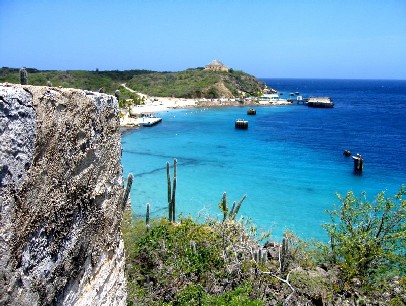 trip to Budget Marine found none in stock and $65.00 to get one shipped. A direct call to Mercury found no help whatsoever and I might add that if you are in the Caribbean you should consider a Yamaha outboard motor. About 90% or more of the outboards we see are Yamaha and repairs and parts are much more available and besides I consider Yamaha a much better built engine. So now I had to cobble up a solution without repair parts. After using four cable ties the accelerator cable was secure. The end result was that the slack is now out of the cable and the engine rpm's are up and it performs much better than before. The speed is so improved that the dinghy will now plane with three people aboard. My mechanical skills are improving at such a rate that I now include generator repairs in my repertoire. After three or four days of trouble shooting a faulty alternator, I found a well hidden wire connector that had burnt out (the why of this is still not know). No such part was within bus range of the boat so again I forged ahead with a MacGyver solution in mind. After wiring six wires one at a time, now all too short to reach, the generator runs and the fuel pump that had also been on the blink now works. trip to Budget Marine found none in stock and $65.00 to get one shipped. A direct call to Mercury found no help whatsoever and I might add that if you are in the Caribbean you should consider a Yamaha outboard motor. About 90% or more of the outboards we see are Yamaha and repairs and parts are much more available and besides I consider Yamaha a much better built engine. So now I had to cobble up a solution without repair parts. After using four cable ties the accelerator cable was secure. The end result was that the slack is now out of the cable and the engine rpm's are up and it performs much better than before. The speed is so improved that the dinghy will now plane with three people aboard. My mechanical skills are improving at such a rate that I now include generator repairs in my repertoire. After three or four days of trouble shooting a faulty alternator, I found a well hidden wire connector that had burnt out (the why of this is still not know). No such part was within bus range of the boat so again I forged ahead with a MacGyver solution in mind. After wiring six wires one at a time, now all too short to reach, the generator runs and the fuel pump that had also been on the blink now works.
Well enough back patting. On the we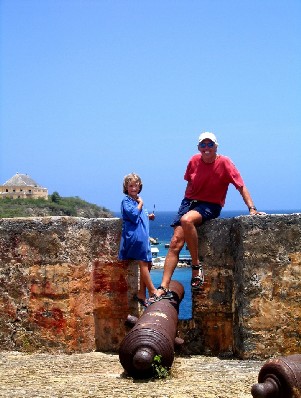 ekends Spanish Waters is full of sail boarders, day sailors, power boaters and the nearby beaches are populated but certainly not crowded. The wind blows most of the time with occasional gust to 35 knots. We do go swimming at the local beaches when the wind doesn't blow like stink and when we have the time. It seems that schooling is taking up lots more of our time than when we started out. Santa Barbara is the beach we use for swimming. It is private but for now the area is under development and anyone with a boat can tie up to the buoys that mark the swimming area of this beautiful white sandy beach. There are several other places to snorkel and dive within the distance of a dinghy ride. One with a sunken tug in 20 ft of water is surrounded by beautiful fish and coral and this location keeps us entertained about once a week. As you snorkel near the tug a large array of fish come to greet you since they have been abundantly fed by previous divers and snorkelers. The parrot fish in the area are neon blue and this surreal color makes you think they are there to advertise something. ekends Spanish Waters is full of sail boarders, day sailors, power boaters and the nearby beaches are populated but certainly not crowded. The wind blows most of the time with occasional gust to 35 knots. We do go swimming at the local beaches when the wind doesn't blow like stink and when we have the time. It seems that schooling is taking up lots more of our time than when we started out. Santa Barbara is the beach we use for swimming. It is private but for now the area is under development and anyone with a boat can tie up to the buoys that mark the swimming area of this beautiful white sandy beach. There are several other places to snorkel and dive within the distance of a dinghy ride. One with a sunken tug in 20 ft of water is surrounded by beautiful fish and coral and this location keeps us entertained about once a week. As you snorkel near the tug a large array of fish come to greet you since they have been abundantly fed by previous divers and snorkelers. The parrot fish in the area are neon blue and this surreal color makes you think they are there to advertise something.
The likelihood of a hurricane in Curacao is so low that the ABC's are outside of the hurricane exclusion zone as defined by our insurance company. A hurricanes this far south is rare but not unheard of and in fact, Hurricane Charlie passed within 65 miles of Bonaire. Our friends in Bonaire told of all the boats moving into the marina to tie up together until the threat passed. This of course made for a great deal of confusion and one hell of a party. Our traveling companions on Camperdown were back in the US visiting family and friends staying in their condo in Venice, one of the areas hardest hit by Charlie. Thanks to email we were able to hear from them soon afterwards that they were fine and their condo was spared.
We are anxious to push on but not while the weather is so uncertain. So we will sit here and entertain ourselves for now
Back Next
|